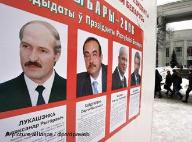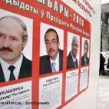
OFFICIAL MINSK IS PREPARING FOR A COUP
Publication: Eurasia Daily Monitor Volume: 3 Issue: 53
By:

The Belarusian authorities have exacerbated the tension surrounding the 2006 presidential election campaign by declaring that the opposition plans an uprising on Sunday, March 19. KGB chief Stsyapan Sukharenka has warned that any demonstrations will be regarded as acts of terrorism. Participants could theoretically be imprisoned for 25 years, jailed for life, or even face the death penalty for appearing in public on the day of the vote. He cited a false exit poll allegedly confiscated from the Partnerstvo group as well as potential Georgian involvement in an uprising.
The plot thickens daily. Belarusian TV has announced the confiscation of a large supply of tents, military goods, and clothing at the Latvian border, which reportedly came from the United States and allegedly was intended for a “color revolution” in the streets of Minsk. On March 15, the Belarusian police established an emergency headquarters, began to monitor all polling stations, and placed personnel on a high alert. President Alexander Lukashenka has claimed that foreign hooligans from Georgia, Ukraine, and Russia are prepared to enter the country to participate in an attempt to unseat his government.
That a call has been made for a public demonstration on Sunday evening in October Square is well known. The two opposition candidates have made separate appeals for a peaceful display — Alexander Milinkevich’s is timed for 8 pm; and Alexander Kazulin’s for 9 pm. The early election results from closed stations, hospitals, and military bases are anticipated by 9 pm, but the first preliminary results will not be known until 2 am on March 20, according to Lidziya Yarmoshyna, head of the Central Election Commission. Thus the protests are not timed to coincide with the declaration of the election results.
Belarusian TV has also focused on the United States and its political goals to a remarkable degree, offering an analysis of the outlook and activities of the last three ambassadors and purporting to show that U.S. diplomats have consistently met with the opposition and refused to meet with government representatives, even when such was the ostensible reason for their travel. A host of claims have been made about outside interference in the elections, most often directed at Poland and Latvia (and to a lesser extent, Ukraine).
Clearly, whatever his lead in the race, Lukashenka is obsessed with the notion that he could fall from power. This is not very likely on paper, though the campaign of Milinkevich has made remarkable progress, and in one case at least, an audience of more than 6,000 people came to hear him speak. During the time available for the campaign, however, he has managed to visit and speak with only about one-third of the electorate.
The campaign of Kazulin, like that of Milinkevich, has been marred by the arrests, detention, and physical abuse of team leaders. On March 9, Kazulin proposed to Milinkevich that they withdraw their candidacies as a form of protest, leaving the field to Lukashenka and Syarhey Haidukevich. Withdrawal from the campaign at this stage would require a candidate to reimburse the state for monies spent on publishing materials for the campaign. In any event, Milinkevich declared that he would remain in the race to the end. Kazulin’s motives are open to question, though he has enlivened the campaign with sensational speeches and clashes with the authorities. That he has not been charged for his alleged offenses may reflect the government’s desire to deal with opposition leaders in its own way once the campaign is over.
But why is Lukashenka so anxious? Most polls put his popularity in the region of 50-60%, far ahead of his three rivals. Milinkevich’s standing is somewhere between six and 17% but rising. For the president, this constitutes a serious problem. A man who has decried his rivals as foreign agents, scum, and potential terrorists can hardly be satisfied with a vote total that hovers around the 50% mark. Potentially that could even signify the need for a second round. Milinkevich has stated, “If the elections are fair, a second round is inevitable.” On the other hand, an official announcement of a Lukashenka victory in the region of 75-80%, with his three challengers together receiving less than 20%, is tantamount to an admission of a rigged election. And that tally would raise the number of people who would participate in street demonstrations.
It is clear that a second round, from Lukashenka’s perspective, is simply unacceptable. It would demonstrate vulnerability and provide an opposition candidate — most likely Milinkevich — with a new opportunity to sway the electorate, including better access to the media. Despite the arrests and harassments, which have encompassed all three major party leaders on the Milinkevich team–Vyachorka (Popular Front), Lyabedzka (United Civic Party), and Kalyakin (Party of Communists)–there are increasing signs that the fear factor, the main source of Lukashenka’s entrenchment, has been partially overcome.
Thus while the democratic opposition will not win the 2006 election, it has made significant inroads toward undermining and weakening the Lukashenka regime. The president cannot resolve the dilemma of how best to announce the final results. Street violence, principally in Minsk, is very likely, and the aftermath of the campaign may prove more important than the actual results of the election.
(Belaruskaya gazeta, Belorusy i rynok, March 13; Narodnaya volya, March 11-12; Belarusian TV, March 15 and 16; AFP, March 16; BBC Monitoring, March 15; NTV, March 16)




